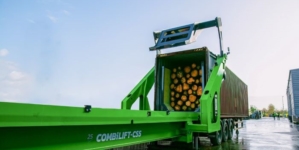-
ROSSLARE EUROPORT TARGETS HEALTH & SAFETY WITH CAMERA TELEMATICS PARTNERSHIP - 2 days ago
-
Landmark Study Reveals Wearable Robotics Significantly Boost Safety and Efficiency in Industrial Environments - July 24, 2024
-
Visku Tackle The Retail Seasonality Challenge One Pallet At A Time - July 22, 2024
-
KAMMAC AND BERGEN LOGISTICS STRENGTHEN FASHION & LIFESTYLE SERVICES IN THE UK - July 19, 2024
-
TENTBOX EXTENDS PARTNERSHIP WITH ARROWXL TO SUPPORT INCREASING DEMAND - July 17, 2024
-
The Perfume Shop improves customer journeys while driving profitability in partnership with Scurri - July 17, 2024
-
ZEROMISSION SECURES £2.3M ($3M) INVESTMENT TO ACCELERATE ELECTRIC FLEETS - July 16, 2024
-
BCMPA CELEBRATES SUCCESS OF 2024 CONFERENCE - July 15, 2024
-
Best of the Best: Jungheinrich Celebrates Triple International Award Win - July 12, 2024
-
GOPLASTICPALLETS.COM CALLS ON NEW CHANCELLOR RACHEL REEVES TO CONSIDER PLASTIC PACKAGING TAX REFORM - July 10, 2024
Grimmway Farms Partners With CHEP To Boost Sustainability, Improve Operations.
When Grimmway Farms, the world’s largest carrot producer, and CHEP, the global leader in pooling and supply chain management solutions, work together, the results are measurable and clear: improved sustainable practices and increased operations efficiency. Last week’s inaugural Global Organic Produce Exposition & Conference (GOPEX) featured both companies, together again. Since partnering with CHEP, Grimmway Farms has realized the economic and environmental benefits of moving from white wood pallets to pooled pallets.
“Grimmway Farms is always looking for sustainable options that improve operations,” says Jason Higbee, Director of Materials Management, Grimmway Farms. “CHEP understands the fresh produce industry, and the need to keep our supply chain moving as efficiently as possible so we can meet customer expectations while also cutting costs and carbon.”
For the global produce leader, the sustainability savings realized since 2009 from shifting 2.9 million pallets to CHEP’s circular model include:
· Elimination of more than 1.63 million pounds of solid waste.
· Reduction of more than 1.23 million pounds of CO2e, the equivalent of eliminating 1.4 million miles driven by an average passenger vehicle in one year!
Building on that success, Grimmway Farms recently brought CHEP into its Cal-Organic Farms facilities to suggest process improvements for reducing pallet damage, cutting costs and further improving sustainability. The suggested changes, identified by the CHEP Supply Chain Solutions team and tested at the CHEP Innovation Center, include adjustments in pallet handling and sorting. Reducing pallet damage and properly sorting pallets creates several expected sustainability benefits, including:
· Reduction of natural resources (timber) needed in the first place.
· Less wood waste going to the landfill, reducing costs and carbon.
· Fewer returned pallets, reducing the frequency of trips and related costs and carbon.
“CHEP created one of the world’s most sustainable logistics businesses through the share and reuse of our products,” says Laura Nador, President, CHEP North America. “Our work protects forests and reduces landfill. By collaborating with Grimmway Farms, we can do even more to solve shared challenges – from taking out transport miles to fighting food waste. There’s no end to what we can achieve together.”
CHEP’s Supply Chain Solutions leverage the company’s end-to-end supply chain expertise to help customers improve efficiency, reduce costs and increase sales. CHEP Solutions include Transportation Optimization, Unit Load Optimization, Product Damage Reduction, Packaging Performance Testing, Environmental Sustainability and Customer Pallet Storage programs.

































